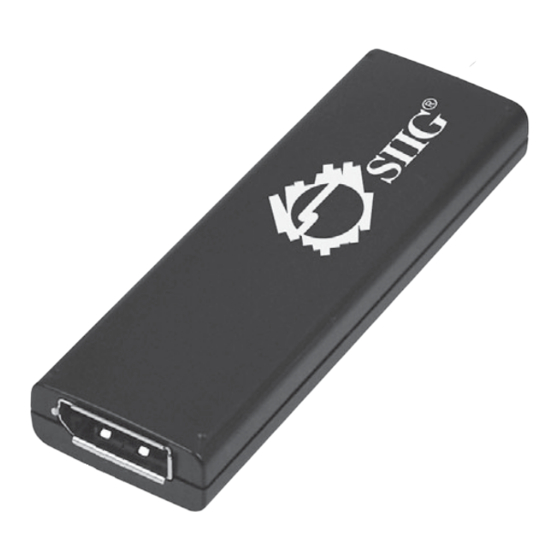
Table of Contents
Advertisement
Quick Links
Introduction
The USB 3.0 to DisplayPort Adapter adds a
DisplayPort port to your USB 3.0 enabled system.
Key Features and Benefits
•
Compliant with Universal Serial Bus 3.0
Specification
•
Supports high resolution up to 1080p (Full
HD) & 2560 x 1600 (WQXGA)
•
Connect up to 6 adapters per system
•
Display modes: Primary, Extended & Mirror
•
Supports 5.1-Channel audio
Serial Number Sticker
For future product return or exchange, this serial
number is required. Please keep it for your
reference.
04-0828B
USB 3.0 to DisplayPort
Adapter
Quick Installation Guide
1
Advertisement
Table of Contents

Summary of Contents for SIIG USB 3.0 to DisplayPort Adapter
-
Page 1: Quick Installation Guide
USB 3.0 to DisplayPort Adapter Quick Installation Guide Introduction The USB 3.0 to DisplayPort Adapter adds a DisplayPort port to your USB 3.0 enabled system. Key Features and Benefits • Compliant with Universal Serial Bus 3.0 Specification • Supports high resolution up to 1080p (Full HD) &... -
Page 2: System Requirements
USB 2.0/3.0 port (USB 3.0 recommended) • Windows 8 (32-/64-bit) / 7 (32-/64-bit) / ® Vista (32-/64-bit) / XP SP3 (32-bit) Package Contents • USB 3.0 to DisplayPort Adapter • USB Cable (Type A to Micro-B) • Driver CD • Quick installation guide Layout USB 3.0 Micro-B... -
Page 3: Software Installation
Software Installation Make sure the proper version driver for your graphics card is installed, the USB 3.0 to DisplayPort Adapter is not designed to work with Windows' Standard VGA Graphics Adapter driver. Important: Do not plug the adapter into the computer until instructed to do so. - Page 4 Plug the adapter into the computer and the driver will be installed automatically. Restart your system to complete the installation. Windows Vista (32-/64-bit) Insert the driver CD. Close CD autoplay box if prompted. Click Start, in the Start Search box, type D:\setup.exe, press Enter.
- Page 5 Windows XP (32-bit) Insert the driver CD. Click Start, Run, type D:\setup.exe, then click OK. (Change D: to match your CD/DVD-ROM drive letter) Select I Accept. Connect your second monitor to the adapter and turn it on. Plug the adapter into the computer and the driver will be installed automatically.
-
Page 6: Display Configuration
Display Configuration After successful driver installation, a display utility icon will appear in the taskbar by the system clock. Note: The icon may be hidden in the Windows System Tray. Click the arrow icon to bring it Selectable Viewing Modes Access the utility by clicking the utility icon and click UHD-100 DP. - Page 7 • Extend: This is the default setting of the USB 3.0 to DisplayPort Adapter. This mode extends your desktop for easy viewing of multiple windows. The window will move off the primary display from the right side and enter the extended display from the left side.
- Page 8 • Mirror: Duplicates the primary monitor to the monitor which connects with the USB 3.0 to DisplayPort Adapter. • Off: Turns off the USB 3.0 to DisplayPort Adapter. • Optimize for Video (not available in Windows XP): Optimize the video quality when playing back.
-
Page 9: Extended Mode
For Windows XP: Right click, select Properties, then select Settings tab. Extended Mode Refer to the Multi-Monitor Configuration on page 8 to open the configuration page. In the Display drop-down menu, select the preferred monitor. For Windows 8 / 7: In the Multiple displays drop-down menu, select Extend desktop to this display. - Page 10 Figure 3: Monitor Orientation Mirror Mode Refer to the Multi-Monitor Configuration on page 8 to open the configuration page. In the Display drop-down menu, select the preferred monitor. For Windows 8 / 7: Check Multiple displays, select Duplicate these displays. For Windows Vista: Uncheck the Extend the desktop onto this monitor box.
-
Page 11: Windows Shortcut
Primary Monitor Refer to the Multi-Monitor Configuration on page 8 to open the configuration page. In the Display drop-down menu, select the preferred monitor. For Windows 8 / 7: Check the Make this my main display box. For Windows Vista: Check the This is my main monitor box. - Page 12 Cursor Disappearing In some cases, when removing the adapter while in extended mode, the desktop will still be paired to the add-on monitor(s) and the mouse cursor may not return to the primary monitor. If this happens, connect the add-on monitor(s) and adapter again or keep moving the mouse.
- Page 13 Windows Vista (32-/64-bit) Open Control Panel> Programs> Programs and Features. Click DisplayLink Graphics, click Uninstall, then click Yes. At User Account Control, click Allow. Select Automatically close applications and attempt to restart them after setup is complete, click OK, and click OK again. Click Yes to restart the computer.
-
Page 14: Frequently Asked Questions
Advanced/Monitor. Note: Select the USB 3.0 to DisplayPort Adapter and do not set the refresh rate higher than what your monitor can support. Why can't I make the USB 3.0 to DisplayPort Adapter the primary display? Some video cards ship with a utility that prevents other video cards from being set as the primary video card. -
Page 15: Technical Support And Warranty
Go to www.siig.com, click Support, then REQUEST A PRODUCT REPLACEMENT to submit a request to SIIG RMA or fax a request to 510-657-5962. Your RMA request will be processed, if the product is determined to be defective, an RMA number will be issued. - Page 16 Fremont, CA 94538-3152, USA Phone: 510-657-8688 USB 3.0 to DisplayPort Adapter is a trademark of SIIG, Inc. SIIG and the SIIG logo are registered trademarks of SIIG, Inc. Microsoft and Windows are registered trademarks of Microsoft Corporation. All other names used in this publication are for identification only and may be trademarks of their respective owners.












Need help?
Do you have a question about the USB 3.0 to DisplayPort Adapter and is the answer not in the manual?
Questions and answers